|
|
 |
 |
|
 |
 |
|
|
 |
 |
|
 |
 |
|
|
|
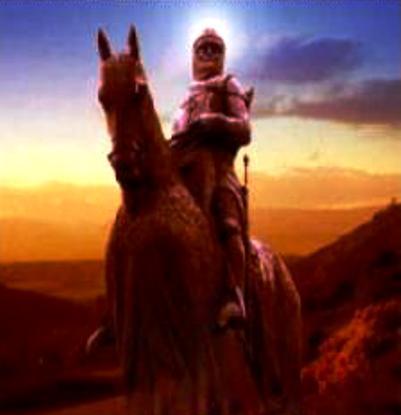
Of Hereford's
high blood he came,
A race renown'd for knightly
fame.
|
|
|
|
 |
 |
 |
 |
|
|
|
He burned before his Monarch's
eye
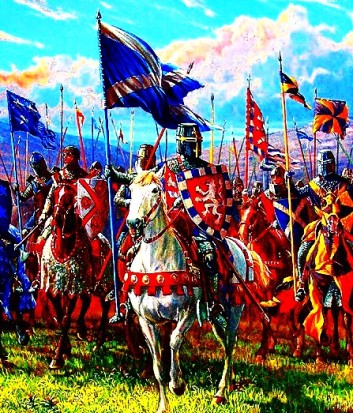
To do some deed of chivalry.
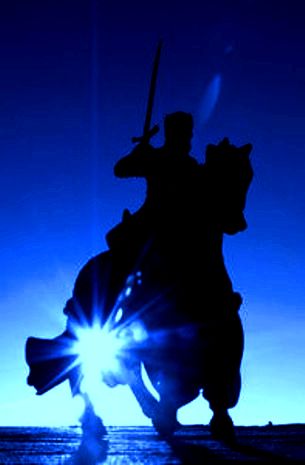
He spurr'd his steed, he couched
his lance,
|
|
|
|
 |
 |
 |
 |
|
|
|
He darted on The Bruce at once.
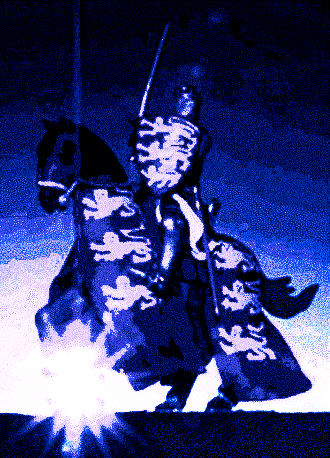
As motionless as rocks,
That bide the wrath of the advancing
tide,
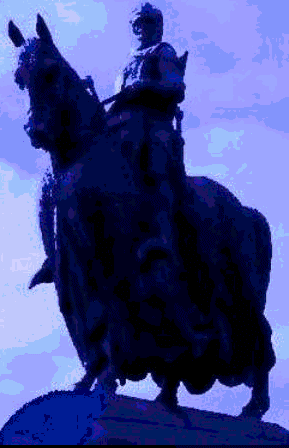
|
|
|
|
 |
 |
 |
 |
|
|
|
Each breast beat high,
And dazzled was each gazing eye -
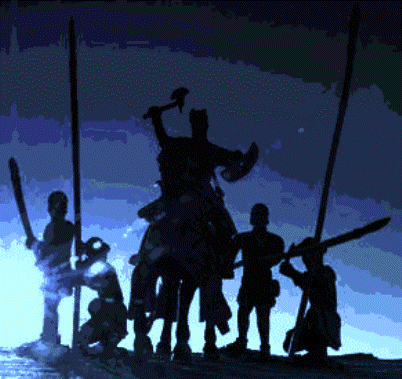
The heart had hardly time to think,
The eyelid scarce had time to wink,
|
|
|
|
 |
 |
 |
 |
|
|
|
While on the King, like flash of flame,
Spurr'd to full speed
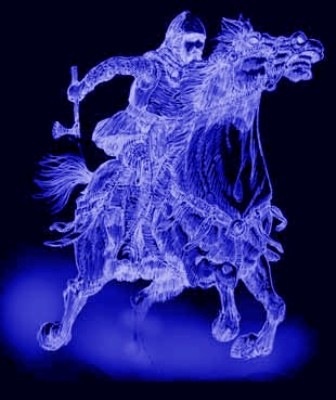
|
|
|
|
 |
 |
 |
 |
|
|
|
The partridge may the falcon mock,
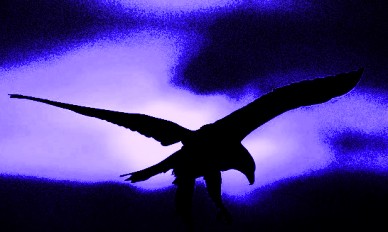
If that slight palfrey stand the shock -
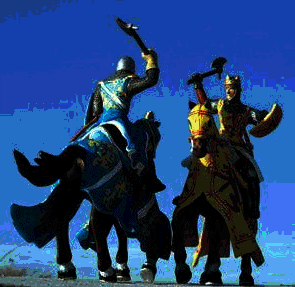
But, swerving from the knight's career,
Just as they met,
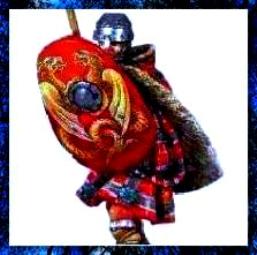
|
|
|
|
 |
 |
 |
 |
|
|
|
Onward the baffled warrior bore His course –
But soon his course was o'er!
High in his stirrups stood the King,
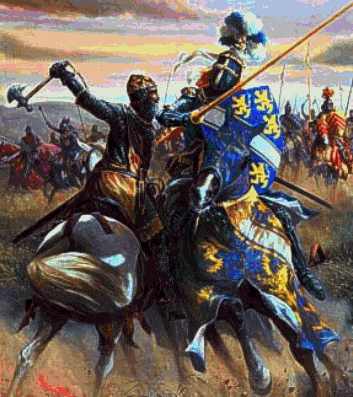
And gave his battle-axe the swing.
Right on de Bohun,
the whiles he pass'd,
Fell that stern dint –
The
first - the last!
|
|
|
|
 |
 |
 |
 |
|
|
|
Such strength upon the blow was put,
The helmet crash'd like hazel-nut;
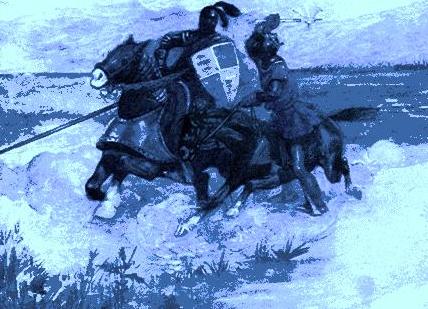
The axe-shaft, with its brazen clasp,
Was shiver'd to the gauntlet grasp.
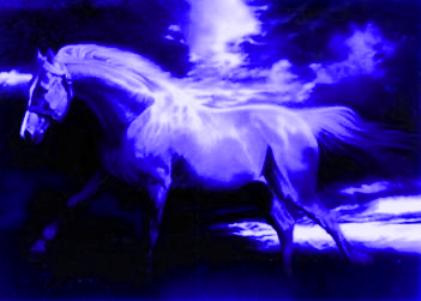
Springs from the blow the startled horse,
|
|
|
|
 |
 |
 |
 |
|
|
|
Drops to the plain the lifeless corse;
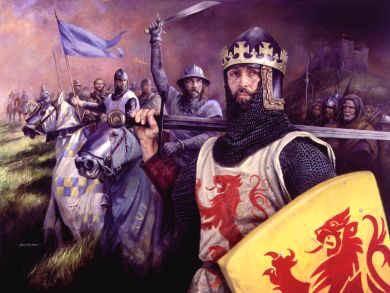
|
| ROBERT THE BRUCE |
First of that fatal field, how soon, how sudden,
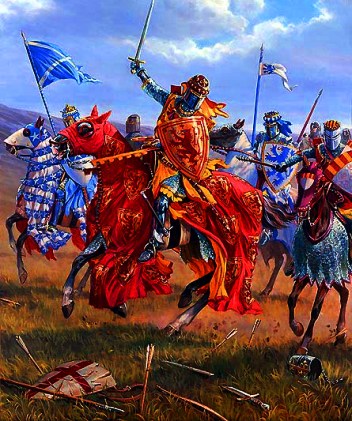
Fell the fierce de Bohun.
|
|
|
|
 |
 |
|
|
 |
 |
|
 |
 |
|
 |
 |
|
|
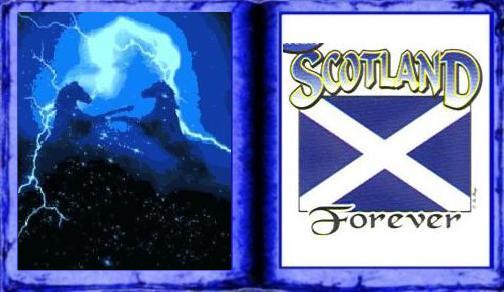
and an English knight, Sir Henry de Bohun, on the day before
the Battle of Bannockburn in 1314.
|
|
|
 |
 |
|
|
 |
 |
|
|
 |
 |
|
|
 |
 |
 |
 |
|
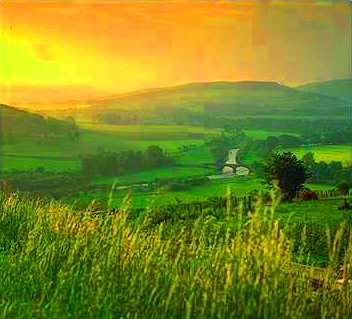
|
| TROSSACHS |
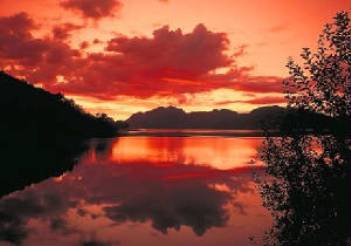
|
| GLENCOE |
|
Scots Wha Hae
By oppression's woes and pains!
By your sons in servile chains!
We will drain our dearest
veins,
But they shall be free!
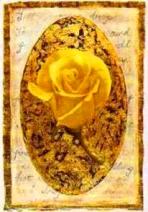
Lay the proud usurpers low!
Tyrants fall in ev'ry foe!
Liberty's in ev'ry blow! -
Let us do - or die!
Robert Burns
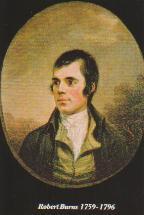
|
| "Rabbie" |
|
|
 |
 |
 |
 |
|
 |
 |
|
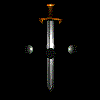
"We rede of ane rycht famouss of renowne,
Of worthi blude that ryngis in this regioune,
And hensfurth I will
my process hald,
Of Wilyham Wallas yhe haf hard beyne tald"
The Wallas of Blin Harry
The Minstrel Blind Harry
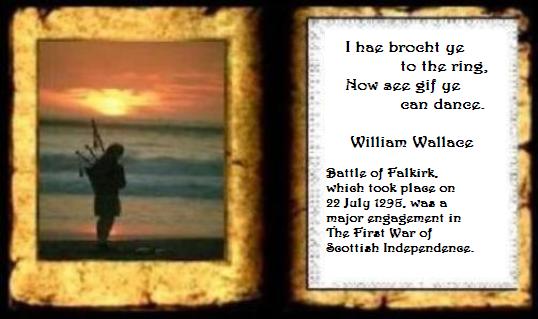
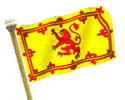
is one of Scotland's greatest
national heroes,
undisputed leader of the Scottish resistance
forces during the first years of the long
and ultimately successful struggle to free
Scotland from English rule at the
end of the 13th Century.
|
|
 |
 |
|
|
 |
 |
 |
 |
|
 |
 |
|
|
|
Abbreviated Timeline of Medieval Pictish
History
43 AD
Apparent king of the Orkney's sent ambassadors to
Claudius during his conquest of Britain. Tribes of native people were thought to be war-like,
fought naked in battle, fought between themselves, and were basically barbaric in their culture.
82-90 AD
Agricola leading four Roman legions wages battle
with the 'Caledonians" in the battle at Mons Graupius. The barbarians, led by 'Calgicus', was referred to by the historian
Tacitus as "a man of high courage and lineage". Tacitus (Agricola's son in law) wrote that the Caledonians had "reddish hair and large limbs".
122 AD
Construction of the Hadrian Wall (along the River
Fife), the dividing line between modern day Scotland and England, to defend against the unconquered barbarians to the
north. A tribute to the tribal bands who, faced with the Roman challenge, became organized into a successful defense.
297 AD
Only four Roman writers mention the Picts by name
(Picti or Pretanii). The first reference by Eumenius in 297 AD, in a description of travels by Constantius in and to the north
coast of Scotland, described 'a nation, still savage and accustomed only to the hitherto semi-naked Picts and Hibernians as
their enemies, yielded to Roman arms and standards without difficulty.' This is in reference to the original conflicts between
the Picts and Agricola.
Claudius Claudianus writing in the early 5th century
wrote of the people of Britain in the female as 'clothed in the skin of the Caledonian beast, her cheeks tattooed, a deep
blue cloak sweeping down to her feet' and another reference 'the legion which had been left to guard far-distant Britain,
which had kept the fierce Scots in check and gazed at the strange shapes tattooed on the faces of the dying Picts' in both
cases the term tattooed is literally 'iron-marked' suggesting the use of an iron needle rather than body painting.
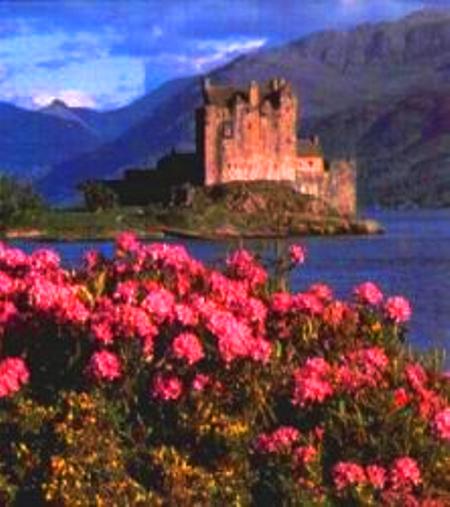
|
400-500 AD
Recorded Pictish legend of a great warrior and king.
Cruithne, who ruled over Alba (a name which can mean all of Britain or just the lands north of the
Hadrian Wall) for 100 years. He had seven sons, and after his death each ruled an area of their father's kingdom. These names
give us some rough ideas of how Pictland was divided. The western highlands, for instance were peopled by the Scots, originally
from the north of Ireland. In 500 AD under
King Fergus the Scots invaded Argyll and established the realm of Dal Riada. Pictland, based upon place names and cultural
sites appears to be centered in the north and east of Scotland.
500-600 AD
When the Romans departed Britain
in the late 4th century, Christian missionaries in Ireland
that remained behind continued to document their life. Perhaps the most famous missionary to the Picts was Saint Columba,
a follower of Saint Patrick who, who in 563 AD left Ireland for the island of Iona to establish a monastery that persisted
for 250 years. Columba is credited for having written or overseen the creation of the Book of Kells. In it we gain glimpses
of Pictish and Celtic lifestyle. It should be noted that by this time, the Saxons had effectively wiped out the missionaries
remain in Britain. Columba traveled up
the Great Glen River
to the palace of the powerful Pictish King, Bridei (Brude) near Inverness. According to Columba's
hagiographer St. Adamnan, he had a magical duel with Brude's chief magician, Broichan, and was of course victorious, and even
cowed the fearsome kelpie, or water horse that inhabited the loch Ness.
What is more likely is that Columba's travels became
the first exposure of Christianity into Pictland, and the subsequent conversion (or attempted conversion) of the Picts from
Paganism to Christianity.
So by this time the major power centers, and struggles,
were between the kingdoms of the northern Picts, their southern kinsfolk, the Dalriadan Scots, and the Britons of Strathclyde
and Lothian. However by now the lands south of the Hadrian Wall were occupied by Saxons and Angles, and trouble was brewing.
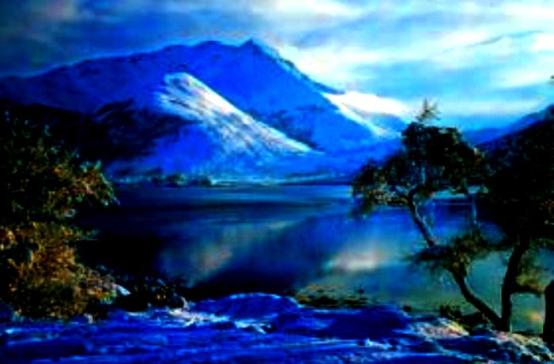
|
|
|
|
|
 |
 |
 |
 |
|
|
|
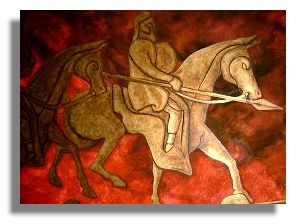
603 AD
King Aedan of Dalraida, alarmed by the expansive
aspect of the Angles in Northumbria, built an army of Scots and Picts to invade the
Northumbrians at Degastand (south of Strathclyde). The King of the Scots wasn't particularly well liked by Picts, but he had
married a Pictish Princess, and the Kings had agreed that the threat of the Angles from the south was too great to ignore.
The battle waged and King Aedan was resoundly defeated, his two sons killed, and he disappeared from history.
657-685 AD
Much of southern Pictland is occupied by the Angles,
and their bishops, and the Picts attempted numerous rebellions. However a new player emerged who was to become as important
in Scottish history as Robert the Bruce, and that was the Pict Bridei, grandson of King Neithon of Strathclyde. During his
campaign around 680 AD, Bridei garnered control over the northern Pictish lands, then in 683 AD proceeded to subdue the Scots,
including assaulting their capitol at Dunaad in Argyll. His ultimate challenge was achieved when in 685 AD he brought the
Northumbrians to battle at Nechtansmere, also known as Dunnichen in Angus. In a decisive military maneuver, Breidei and his
Picts slaughtered King Egfrid, defeating the Northumbrians, precipitating their decline of power and eventual absorption into
the emerging Kingdom of England.
Bridei's momentous victory is recorded in stone
on the beautiful cross slab in Aberlemno churchyard, located a few miles from the battle. So began a period of Pictish ascendancy,
united under one ruler. Several rulers followed Bridei after his death in 693.
706-724 AD
Nechtan mac Derile. Rules, and becomes concerned
about Irish and Scottish religious influence. He expels the Columban monks. Confusion reigns for a while until he resigns
and becomes a monk himself.
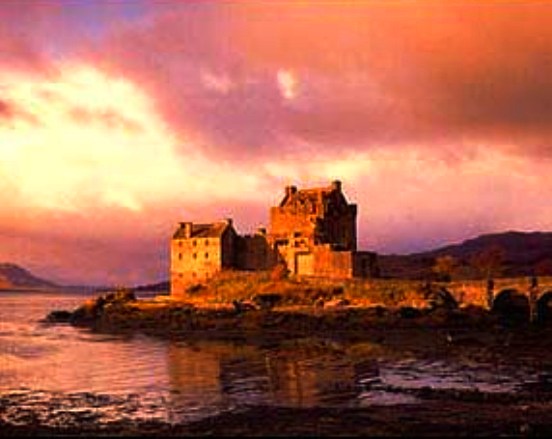
731-811 AD
Oengus Mac Fergus rules, he is a violent and energetic
man, and captures the throne of Dalriada, thus becoming the first King of both the Picts and the Scots. However, in an attempt
to take the kingdom of Strathcldye, he fails, and so limiting
his conquests to the north. Following his death in 761, the Scots threw off Pictish Rule under King Aed. But the notion of
a united kingdom of Picts and Scots was not forgotten, and 789-820 Constantine mac Fergus ruled Pictland and his son, Donald, became king
of Dalriada. On 811, Constantine took over his son's throne
as well.
When Constantine
died, there were a series of new rulers, some Pictish, some Scottish, and with so much intermarriage, the two Kingdoms were
essentially interchangeable by the 820's.
839 AD
What started out as a trickle of Norse trader-pirates
grew to an annual flood of Viking raiders and settlers. A united army of Picts and Scots were then destroyed by Vikings. With
the Picts to the east cut off, and the Dalriada Scots cut off from their cousins in Ireland, the impact of the new Viking threat was undecided. In 842, Kenneth Mac
Alpin, King of Dalriada decided to take the opportunity to move his court to the ancient Pictish royal center at Scone. He then took the Stone of Destiny, an ancient artifact used in the inauguration of Scottish Kings,
from Dunadd., and legend has it that he invited all the Pictish nobles to a feast and proceeded to massacre them. This was
probably untrue, as the Vikings had already decimated them in battle.
Although there was some resistance, by 848 Kenneth
Mac Alpin had become the first true King of the Scots. By moving the center of power, his diplomacy, force of personality
and arms, and by rallying against the Norseman, he ended the rule of two kingdoms by making them into one.
With a Scottish
Court, Gaelic became the language of the court and the new ruling class, and with it a resurgence
of the Columban church. The Pictish language and culture declined, and they quickly became lost in history,

but their legacy in stone is still with us.
|
|
|
|
 |
 |
 |
 |
|
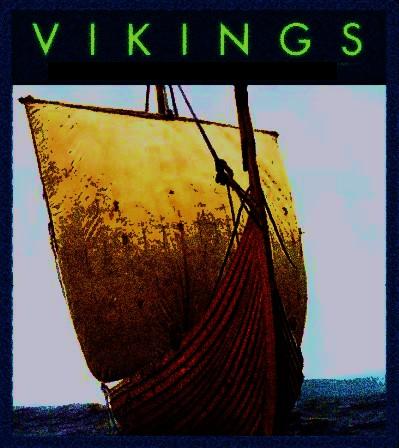
Throughout the Viking Age, which lasted for 300 years from 793 AD to the 11th century, the Vikings'
spirit of adventure and swift ships brought them to great lands. Vikings, Scandinavians from the modern day countries of Denmark,
Norway and Sweden, were great warriors skilled in raiding and looting. But they were also successful merchants and farmers
who settled in newly discovered lands. Travel with the Vikings in search of fortune and land from Britain to the
North Atlantic and from Russia to the Middle East!
Scotland and Ireland
suffered from seasonal raiding by Vikings along its coasts in the early 800s.
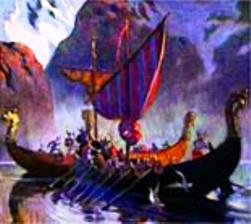
In Scotland, Vikings soon settled in the Shetlands and in the Orkneys, where Scandinavian
influence would prove lasting; Norn, a Scandinavian dialect, was spoken until the 18th century and many Scandinavian place-names
are still used today. Norway ruled the
Orkneys until 1468 and the Shetlands until 1468. Although these Scottish lands were sometimes used as jumping-off points for
raids on Ireland and England,
the Vikings' main occupation here was farming and fishing.
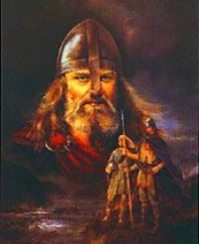
In Ireland, decades after their initial
raid in 795, Viking armies began staying the winter, rather than returning home, in order to set up bases for further looting.
By the mid-ninth century, Vikings had established small enclaves such as Dublin,
which developed into a short-lived Viking kingdom. Although the Irish eventually gained supremacy in Dublin, the Vikings were integrated into the community as merchants, controlling international
trade.
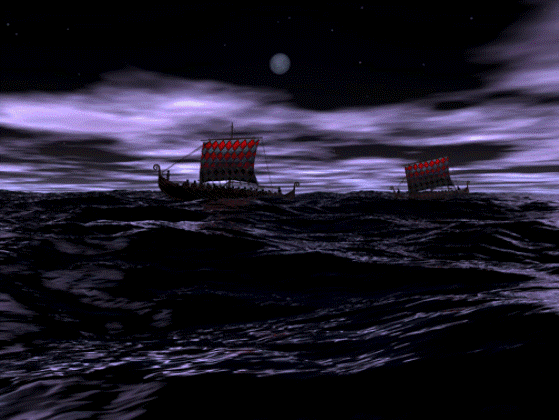
|
|
 |
 |
|
|
 |
 |
 |
 |
|
 |
 |
|
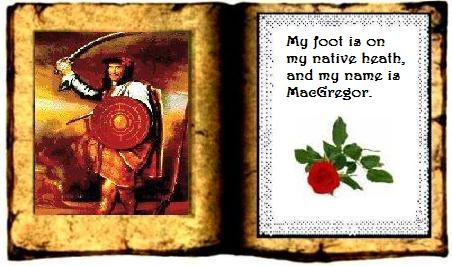
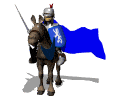
Rob Roy
(The Outlaw, The Hero)
Rob Roy is frae the Hielands come,
Down to the Lowland border;
And he has stolen that lady away, To haud his house in order.
He set her on a milk-white steed,
Of none he stood in awe;
Until they reached the Hieland hills, Aboon the Balmaha'!
Saying, "Be content, be content, Be
content with me, Lady;
Where will ye find in Lennox land, Sae braw a man as me, Lady?

|
Rob Roy, he was my father called,
MacGregor was his name, Lady;
A' the country, far and near, Have heard MacGregor's fame, Lady.
"He was a hedge about his friends,
A heckle to his foes, Lady;
If any man did him gainsay, He felt his deadly blows, Lady.
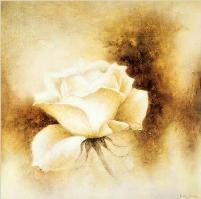
"I am as bold, I am as bold, I am
as bold and more, Lady;
Any man that doubts my word, May try my gude claymore, Lady.
"Then be content, be content, Be content
with me, Lady;
For now you are my wedded wife, Until the day ye die, Lady."
Sir Walter Scott

|
|
 |
 |
|
|
 |
 |
 |
 |
|
History Of Scotland
The recorded history of Scotland
begins in the 1st century AD, when the
Romans invaded Britain. The Romans added
southern Britain to their empire as the
province Britannia. They
were unable, however, to subdue the fierce tribes in the north. To keep these tribes from invading Britannia, Emperor Hadrian had a massive wall built across
the island from sea to sea. The Romans called the land north of the wall Caledonia, and they called the people Picts--from the Latin piclus, meaning "painted"--because they painted their bodies.
Parts of Hadrian's Wall
still stand on the Scottish border.
In the 5th century Celtic immigrants from Ireland, called Scots, settled
north of the Clyde. The Scots were already Christians
when they left Ireland. In the next century St. Columba converted the king of the
Picts to Christianity. In the 9th century Kenneth MacAlpine, king of the Scots, added the Pictish kingdom
to his own. In about the 10th century the land came to be known as Scotland.
After
the Normans conquered England in 1066, many
Anglo-Saxons from England settled in the
Lowlands of Scotland. Here the Scots gradually adopted English ways. Feudalism was established, and the chiefs of the clans
became nobles. Towns grew, trade increased,
and Scotland
prospered.
In 1290 Margaret, heiress to the throne, died. Thirteen claimants contested the Crown. Edward I of England
claimed the right to bestow it and made
John de Baliol king. When Edward asked John for help against the French, however, John entered into an alliance with France. For 260 years Scotland held to this so-called "auld alliance" with England's enemy.
Edward crossed the border in 1296, took John de Baliol
prisoner, and proclaimed himself king of
Scotland. To symbolize the union he carried off the ancient Stone of Scone, on which Scottish kings had long been crowned, and placed it in Westminster Abbey
where it lay beneath the coronation chair.
The
Scots rose again. Led by William Wallace, they routed the English at Stirling Bridge in 1297 and pursued them across the border. The next year Edward returned and inflicted a disastrous defeat on the Scots at Falkirk. Wallace was later captured and executed, and the English hung his head from London Bridge. This
part of the history of Scotland was the
foundation for the film "Braveheart".
The Scots' spirit was still unbroken, and they soon found another great
champion in Robert the Bruce. The last great battle in the war for
independence was fought in 1314
at Bannockburn near
Stirling Castle.
There Bruce inflicted a disastrous defeat on superior English forces led by Edward II. In 1328 Edward III formally recognized
Scotland's independence.
In the later Middle Ages, Scotland
suffered from weak kings and powerful nobles. For two centuries there was a constant struggle between the Crown and the barons.
Border clashes with England also continued. James IV of Scotland married Margaret, daughter of Henry VII of England,
in 1503. When Henry VIII went to war with France in 1512, however, James
IV invaded England. He fell, "riddled with arrows," at Flodden Field in
the last great border battle (1513).
James
V died brokenhearted after his army had been slaughtered at Solway Moss (1542). The throne went to his infant daughter, Mary Stuart.
Meanwhile the Protestant
Reformation had swept across Europe
and into England. Scotland was still a Roman Catholic country. Its young queen,
Mary Stuart, was in France
when John Knox returned
home to Scotland from Geneva,
Switzerland. Knox was a follower of John Calvin, one of the leaders
of the Reformation. With fiery eloquence he spread Calvin's Protestant doctrine. Knox and others drove Mary out. In 1560 Scotland's parliament adopted a confession of faith drawn
up by Knox and established the Church of Scotland on a Presbyterian basis.
When Mary returned to Scotland in 1561, she was imprisoned and forced to abdicate her throne. She escaped, however, and fled to England. Queen Elizabeth I made
her a prisoner and finally had her executed.
Mary Stuart's son, James VI, was brought up as a Presbyterian. When Queen Elizabeth of England
died in 1603, James inherited the throne of England. This is an important point
missed by many historians - it was the Scottish king who took over the English throne, not the reverse. In England
he was called James I. The two nations were thus united under a single king, but Scotland remained a separate state with its own parliament and government.
England tried repeatedly to impose the Anglicans' episcopal
form of worship and church government on the Scottish kirk. The Scots took up arms against Charles I. When civil war broke out in England,
they aided the Puritans against
the king. After Oliver Cromwell executed Charles I without consulting the Scots, however, the Scots welcomed Charles's son as Charles II. Cromwell
then marched into Scotland and imposed
his rule. When Charles II was restored to the throne, persecution of Presbyterians continued.
Finally, after James
II had been driven from the throne, Presbyterianism was firmly established as Scotland's
national church. The Highlanders long remained loyal to the exiled Stuarts. In 1715 they attempted to restore the house of Stuart to the throne; James
Stuart, known as the Old Pretender, was proclaimed
James III. In 1745 they supported his son, Charles Edward, known as the Young Pretender and Bonnie Prince Charlie. The Young Pretender's quest
for the throne ended in 1746 at the battle Culloden when the Highland forces were defeated
by the English.
The age-old rivalry between
Scotland and England
ended formally in 1707 when the parliaments of both nations agreed to
the Act of Union. This
act merged the parliaments of the two nations and established the Kingdom of Great Britain.
Scotland now had free trade with England and the colonies. As Britain's
empire expanded the Scots played a great part in its development. They also shared in the inventions that brought about the Industrial Revolution and in the wealth that flowed into Britain from it.
The end of the 18th century has been called Scotland's most creative period. David Hume won world fame in philosophy and history, Adam Smith in political economy, and Robert Burns in poetry. In the next generation
Sir Walter Scott made the land and history of Scotland
known throughout the world. During this period the Scots were also pre-eminent in establishing the fledgling colonies in America, Canada and Australia.
From that time on, the history of Scotland merges with that of the rest of the United
Kingdom but Scots continued to play a part in world affairs far greater than their numbers
might suggest. Legal and education systems did remain separate (and superior) and in the second half of the 20th century many
Scots began to demand a greater say in other areas of government. Eventually a new Scottish parliament was established in Edinburgh and it is currently making its mark.
|
|
 |
 |
 |
 |
|
History
of Glasgow
|
Glasgow's history stretches back almost two thousand years
and has been rich and varied.
Originally a small salmon-fishing village at a crossing
point on the River Clyde, Glasgow has been shaped by Battles, World Wide Trade and Heavy Industry to become a truly International
City.
Founded by a Christian missionary (St Mungo), Glasgow
became a major religious center. Mungo's original church was destroyed by the wars which swept the country in the years after
his death. Today's Cathedral dates from the 12th Century and has
been added to in the years which followed.
Provand's Lordship,
the oldest house in Glasgow was built over 500 years ago for
the Lord of Provan, an official of the Cathedral. The house still welcomes visitors today to view its proud history.
In 1451 Glasgow became a University City. Glasgow University was originally built in the High
Street area of the city, but was moved to its present site in Glasgow's
West end in 1870.
Glasgow has also been the site of many battles.
Bishop's Castle once stood on the site now occupied by Glasgow's
Royal Infirmary. Here, in 1300, William Wallace (of "Braveheart" fame) with 300 men defeated an army of 1000 English
Knights who had taken possession of the castle under the English Bishop of Durham.
|
|
|
Two centuries later the castle was again the scene of battle
when two opposing forces fought for control of the Crown of Scotland then in the possession of the baby, Mary Queen of Scots. |
|
Due
to its location on the west of the country, Glasgow was well positioned to send shipping to
the West Indies and America.
By the 18th century many merchants had acquired great
wealth by importing sugar, rum and tobacco.
Thus were born the Tobacco Lords who built fabulous mansions
in the city.
However, life was very different for the city's poor. By the
19th century the influx of people looking for employment spawned the emergence of tenement accommodation. The poorest families
were forced to live in "single ends", one roomed homes where the entire family, often including grandparents, would live together.
An example is displayed at The People's Palace. Many families had to share common
lavatories and wash facilities.
However, the struggle for survival generated a common
bond between the tenement dwellers and a great sense of community spirit, kindness and sharing dominated everyday life.
The existence of vast deposits of coal and iron ore in
the Glasgow area shaped the next two centuries of Glasgow's
history. |
|
With
the coming of the Industrial Revolution, aided by technological advances designed by Clydeside inventors such as James Watt,
Heavy Industry in the shape of Railway Locomotives and Shipbuilding flourished.
Locomotives were exported throughout the world. "Clyde-Built"
became synonymous with quality and reliability. The launch of the three "Queens" - luxury passenger liners - was the pinnacle
of Glasgow's shipbuilding achievement. (Many of the original
shipping models are on display in the beautiful "Clyde Room" at the Transport Museum
Sadly, the changing pattern of industry means that the
Clyde no longer employs the vast throngs of workers in the shipbuilding trades, although
there are notable exceptions. The proud "Clyde-Built" traditions are still in evidence among the workforces of BAE Systems
(Govan) and BAE Systems (Scotstoun), to name but two of Clydeside's remaining shipbuilding yards.
|
|
|
 |
 |
 |
 |
|
 |
 |
|
 |
 |
| |
|
|
| |
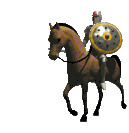
Aye, fight and you may die.
Run, and you'll live... at least a while.
And dying in your beds
many years from now,
would you be willing to trade all the days,
from this day to that,
for one chance,
just
one chance,
to come back here and tell our enemies
that they may take our lives,
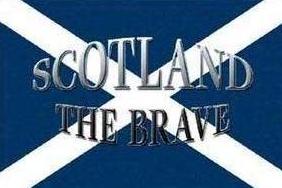
but they'll never take our FREEDOM!!!
|
|
| |
|
|
|
 |
 |
|
|
 |
 |
 |
 |
|
 |
 |
|
 |
 |
| |
|
|
| |
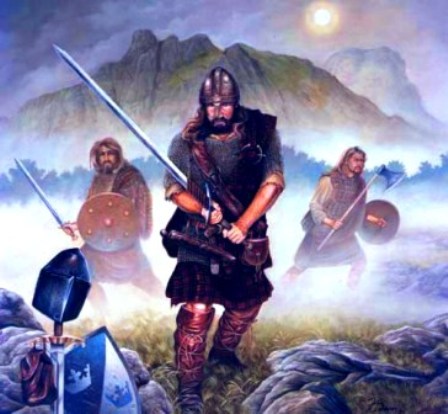
“I cannot
be a traitor,
since I never swore fealty to the English king."

-- William Wallace, defending
himself
against charges of treason.
|
|
| |
|
|
| |
|
|
|
 |
 |
|
|
 |
 |
|
|
 |
 |
|
|
 |
 |
 |
 |
|
 |
 |
|
 |
 |
|
 |
 |
|
|
May the saddest day of your
future be no worse
than the happiest day
of your past.
|
|
|
|
 |
 |
|
|
 |
 |
|
|
 |
 |
|
|
 |
 |
|
|

